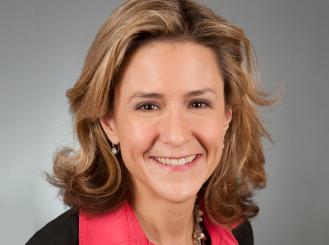By Christina K. Ullrich, MD, MPH, FAAHPM
Chair Elect, 2015 Palliative Care Symposium Program Committee
Building on an enormously successful inaugural Palliative Care in Oncology Symposium in 2014, the 2015 Symposium, cosponsored by AAHPM, ASCO, ASTRO, and MASCC, afforded a wide array of opportunities for oncology and palliative care clinicians and other health care professionals to learn, network, and grow professionally. More than 650 attendees explored many ways in which the realms of oncology and palliative care intersect and how together we can continue to advance the science and care of people with cancer and those around them, throughout the cancer care continuum. For me, being part of this event was thrilling and inspiring.
The innovative format of the General Sessions engaged participants and presented timely and relevant content in a way that was both accessible and thought-provoking. Expert presentations were blended with oral abstract presentations featuring state-of-the-art research. These General Sessions concluded with commentary from leaders in the field that not only contextualized the material presented but also spurred participants to consider the implications for their clinical practice, research, and policy endeavors. The Special Sessions on “Putting the Person in Personalized Medicine” featured content presented via a patient case, which effectively reinforced concepts and underscored why these issues are ultimately so critical.
Complementing the large group didactic learning opportunities, smaller, more intimate sessions offered varied formats for individualized learning and professional and personal development. Among these opportunities were Poster Walks, one-on-one Expert Office Hours, a Fellows, Residents, and Junior Faculty Networking Luncheon, and lunchtime Meet the Faculty Networking Roundtables provided a forum for attendees to discuss specific topics.
I find adequately encapsulating the content to be a challenge due to its extraordinary depth and breadth! It ranged extensively—from the bench (i.e., molecular level), to the bedside, and beyond (i.e., program and policy development across the globe). Symptom management sessions covered pain and non-pain symptoms, with a special focus this year on anorexia and cachexia. Symptom-related sessions also included interesting perspectives such as use of biomarkers and the role of circadian rhythms, to name a few. Another compelling topic was communication, its impact, and strategies to promote timely and effective conversations with patients and families about goals of care and care decisions. Sessions also addressed the needs of those who oftentimes go unseen, such as caregivers and children. A particularly exciting aspect of the research sessions was how many reported on interventions to improve the delivery of palliative care, including technology-based methods.
Partnership and collaboration between oncology and palliative care clinicians was also a major theme, as highlighted by Dr. Vicki Jackson’s keynote talk. There is much to be done and discovered in the care of those with cancer and their caregivers and families. The Symposium was a tremendous catalyst, bringing together clinicians, researchers, policymakers, and other professionals with this common interest, so we can continue to move this work forward, together.
Looking forward to continuing this momentum next year at the 2016 Symposium in San Francisco on September 9-10. See you there!



Recent posts